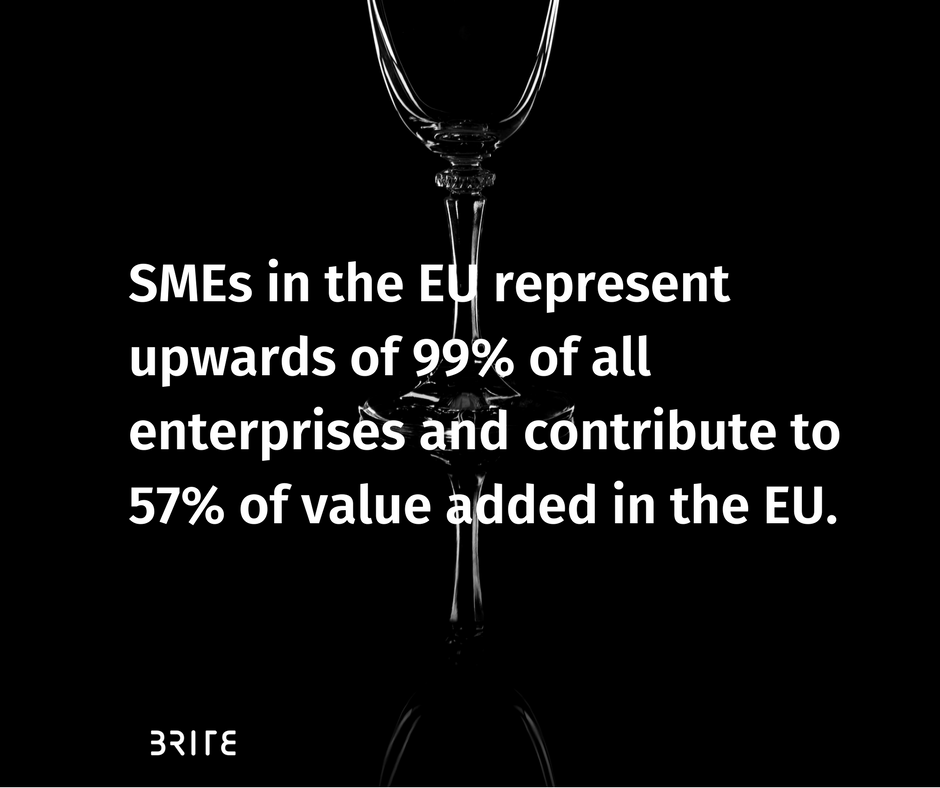They say good things come in small packages, and we couldn’t agree more, especially when it comes to businesses. Small and Medium-sized Enterprises (SMEs) certainly prove this saying right, and they can probably support another interesting business theory – that big things also come in small packages. Here are four things worth considering about SMEs and the important role they play in the world of business.
The Numbers Don’t Lie
Across the world, SMEs are integral to building and supporting economies, particularly in developing countries. According to the World Bank, formal SMEs contribute up to 60% of total employment and around 40% of GDP in emerging economies, and are responsible for 4 out of 5 new positions created in these economies.
The numbers are even more impressive in the EU, where SMEs are key to ensuring continued economic growth, innovation, job creation and social integration. Eurostat asserts that SMEs in the EU represent upwards of 99% of all enterprises (around 23 million SMEs), account for two-thirds of total employment, and contribute to 57% of value added in the EU.
In this sense, big things do indeed come in small packages. However, these packages get bigger over time, as data suggests that SMEs that survive past the five-year mark tend to grow in size, which is reflected in the fact that SMEs in the EU are projected to account for even more of total employment in the near future.
SMEs support one another, which contributes to collective growth
Currently, 9 out of 10 SMEs in the EU are actually micro-enterprises with less than 10 employees. This emphasizes the fact that compared to large companies, SMEs have much smaller global footprints, and most obviously, tighter budgets. This means operating a profitable SME requires lean thinking.
SMEs can’t afford to hire full-time employees who specialize in something other than what their business focuses on. Therefore, what often happens is that one small business will hire another for support with niche service, like accounting or IT work.
Brite is a perfect example of this type of relationship. We support SMEs with marketing, digital and social media, as well as graphic and web design. In doing so, we often collaborate with other SMEs on bigger projects, we sometimes hire experts in a particular area to fill in some gaps, and our team is spread out over several different countries so we generally work from shared spaces, which are also small businesses.
Operating in this manner tends to make smaller business owners and their employees experts when it comes to collaborating, networking and best practice sharing. Sharing is caring in the world of SMEs, so passing on opportunities, learning from each other’s successes and mistakes, and making the most out of recommendations and word of mouth are lean and effective paths towards growth and success.
It’s not that there’s no competition – not all SMEs make it – but being small and staying lean require the ability to collaborate and support one another within established networks.
SMEs drive innovation through partnerships with larger companies
Larger companies can often benefit from the ideas and innovations put forth by SMEs, and given their size and footprint, can often fund and accelerate the work of new small businesses. It’s quite common in the world of tech startups for a micro-enterprise to develop a certain piece of technology that can radically change processes within much larger companies.
In their aptly titled article, Big Companies Should Collaborate with Startups, Eddie Yoon and Steve Hughes argue that the two types of businesses would both improve their success rates if they collaborate instead of compete. The reasoning behind this lies in their two distinct and integral skills: “Startups excel at giving birth to successful proof of concepts [while] larger companies are much better at successfully scaling proof of concepts.”
Again, SMEs make great collaborators, and in some cases their ability to collaborate can drive innovation, and they can scale-up quicker with the support of larger companies. This isn’t necessarily about coming up with a multi-million dollar idea and selling it to the highest bidder, though. SMEs can experience significant growth by becoming corporate suppliers.
In her article entitled Enriching the Ecosystem, Rosabeth Moss Kanter alludes to a study that reveals 70% of 200 surveyed American SMEs that had become suppliers to large companies saw their revenues and employment double in two years after a contract was signed. Moss Kanter goes on to argue that larger companies also push SMEs to develop new features, spurring more innovation. And if ever one small business can’t fulfill the responsibilities or technical requirements needed to take on a larger customer, it can always collaborate with other SMEs to make it happen.
SMEs can play a key role in transitioning to a greener economy
SMEs are actually lagging behind their corporate counterparts in terms of adopting greener business practices and contributing to the shift towards a more sustainable global economy. However, given the amount of people SMEs employ and their prevalence in economies around the world, the global shift towards a greener economy relies heavily on them.
For many SMEs, lack of information, as well as adequate skills and resources are barriers to sustainability. For many SMEs, going green is dependent on realizing that the benefits do in fact outweigh potential costs. Benefits can include government support and incentives, like the EU’s Horizon’s 2020 SME Instrument in the field of energy and the Green Action Plan, which aims to help SMEs take advantage of emerging opportunities in a green economy.
We’ve talked about sustainable supply chains in the past and have pointed out that bigger companies can play a leading role in the shift towards a greener economy. But beyond the initiatives they undertake to reduce their own carbon footprints, they can also mentor SMEs and hold them to certain standards as suppliers. SMEs can also help each other in this regard by collaborating and supporting one another in the same way they already do in other areas of their businesses.
Consumers are becoming more sophisticated, too, and expect more of companies when it comes to social and environmental issues. This might end up being the most direct proof that what’s good for the environment is good for business. Nevertheless, SMEs still have a lot of catching up to do when it comes to sustainability, but collectively they have the power to make a huge difference in the way business is done in the modern era.
_________________________________________
Bradley Castelli
Conte Manager at Brite
SMEs are strategically important across the world and integral to different economies in different ways. Their ability to adapt and the fact that collaboration is always a key to success proves that big things do indeed come in small packages.






